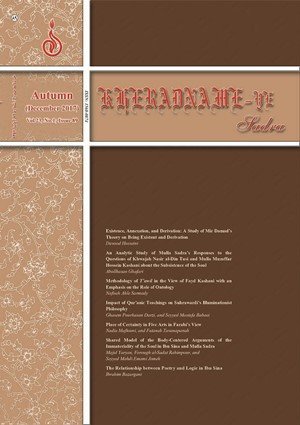-
-
List of Articles
-
Open Access Article
1 - Foreword
Seyyed Mohammad Khamenei -
Open Access Article
2 - Existence, Annexation, and Derivation: A Study of Mir Damad’s Theory on Being Existent and Derivation
Davood Hosseini -
Open Access Article
3 - An Analytic Study of Mulla Sadra’s Responses to the Questions of Khwajah Nasir al-Din Tusi and Mulla Muzaffar Hossein Kashani about the Subsistence of the Soul
Abollhasan Ghafari -
Open Access Article
4 - Methodology of T’awil in the View of Fayd Kashani with an Emphasis on the Role of Ontology
Nafiseh Ahl Sarmadi -
Open Access Article
5 - Impact of Qur’anic Teachings on Suhrawardi’s Illuminationist Philosophy
Qasim Pourhassan Seyyed Mostafa Babaei -
Open Access Article
6 - Place of Certainty in Five Arts in Farabi’s View
Fattaneh Tavanapanah -
Open Access Article
7 - Shared Model of the Body-Centered Arguments of the Immateriality of the Soul in Ibn Sina and Mulla Sadra
Majid Yaryan Furugh al-Sadat Rahimpoor Mehdi Emam Jome -
Open Access Article
8 - The Relationship between Poetry and Logic in Ibn Sina
Ebrahim Bazargani -
Open Access Article
9 - -
-
The rights to this website are owned by the Raimag Press Management System.
Copyright © 2017-2026







